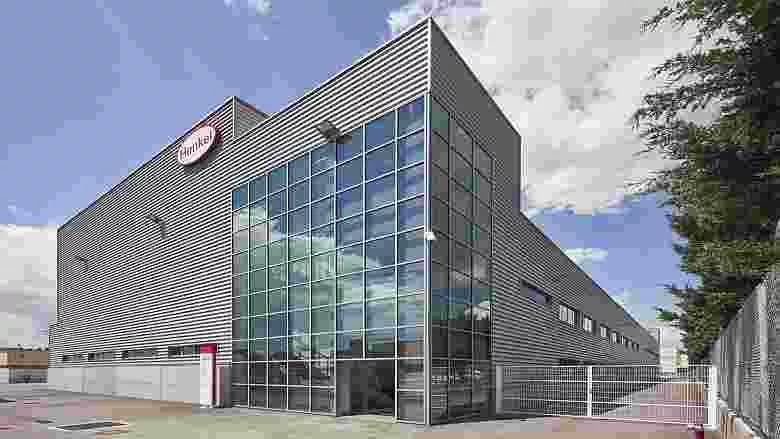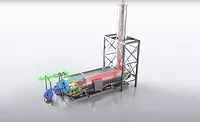Henkel’s Adhesive Technologies Advances Climate-Positive Operations

The aerospace manufacturing plant in Montornès, Spain has been a lighthouse project for Adhesive Technologies. Courtesy of Henkel.
Henkel has a longstanding track-record as a leader in sustainability and last year, the company accelerated efforts to achieve climate-positive operations by 2030 as part of its 2030+ Sustainability Ambition Framework. Specifically, the Adhesive Technologies business unit has translated this framework into its own Sustainability Ambition 2030 and aims to lead the rest of Henkel’s operations by example through implementing new technologies in existing sites and including sustainable technologies in the design phase of new plants.
Adhesive Technologies operates 124 sites around the globe, the vast majority of Henkel´s facilities. To execute its ambition, the business unit is investing in a variety of sustainability projects that focus on increasing the use of electricity generated from renewable sources, implementing technologies to generate thermal energy without fossil fuels, and increasing the circularity of water and production material usage.
“Climate change is one of the biggest challenges of our time and with the ambition of becoming climate positive in operations by 2030 Henkel is leading in the industry for adhesives, sealants and functional coatings,” said Dimitri Kozak, head of Sustainability and Environmental Performance in Operations at Henkel Adhesive Technologies. “Thus, we are taking holistic actions in all our manufacturing sites around the globe. As a first milestone we want to become carbon neutral in production. We have achieved carbon neutrality in our aerospace manufacturing plant in the Montornès del Valles plant in Spain. This year, we have already turned three further adhesive production sites to carbon neutrality with much more to come in the near future.”
To achieve carbon neutral production, Adhesive Technologies invests in technologies that enable the use of 100% local electric and thermal energy. Once installed, manufacturing sites can change the supply of sources to renewable alternatives such as biomass or biogas. By combining on-site renewable energy and green energy procurement, the aerospace manufacturing plant in Montornès has become a lighthouse project for Adhesive Technologies. This year, three additional adhesives manufacturing sites in India, Turkey, and Bosnia and Herzegovina, have become carbon neutral. The three plants reached this goal by drawing electricity from renewable energy sources, along with the deployment of energy efficient solutions such as LED lighting, smart motion sensors, and natural lighting. All fossil fuel users such as hot water boilers and heaters have been replaced by electrical systems.
By the end of 2022, about 60% of all sites operated by Adhesive Technologies were already using electricity generated from renewable sources. When building new sites, Henkel implements sustainability into the design phase. For example, the Songdo plant in Korea, opened in 2022, incorporates a broad range of sustainability features, including solar panels, a rainwater recycling system, and energy-efficient equipment.
Additionally, investing in technology that helps to replace fossil fuels for the generation of thermal energy is important to significantly reduce the CO2 footprint in production. In its Cannon Falls plant in Minnesota, United States, Adhesive Technologies implemented a regenerative thermal oxidizer technology, which provides higher efficiency and reduces gas consumption. The process thermally treats VOCs instead of releasing them into the atmosphere. As a result, the site reduces direct emissions and on average can save more than 11,000 MWh of gas annually.
The use of circular water as well as the circular use of production waste material is another key priority of Adhesive Technologies. By optimizing the hot water cleaning process in one of its facilities in Düsseldorf, Germany, it will be able to save up to 50% freshwater for each cleaning and disinfection cycle and 50% of energy use. The Cannon Falls site has implemented a facility chiller estimated to save 18,000 m3 of water annually. The Warren facility in Michigan, U.S., has introduced a reverse osmosis system that increases water reuse and reduces water consumption by 40% annually.
Adhesive Technologies is constantly improving its disposal methods of its waste streams; 85% of all adhesive manufacturing sites have achieved zero waste to landfill status. The Chivilcoy plant in Argentina has implemented a novel biological waste treatment process with earthworms that transform materials into organic matter. This process allows the annual re-use of around 2,500 m3 of wastewater and the generation of 50 m3 of compost that is donated to local agricultural producers.
To learn more, visit www.henkel.com.
Looking for a reprint of this article?
From high-res PDFs to custom plaques, order your copy today!




.webp?height=200&t=1704834340&width=200)